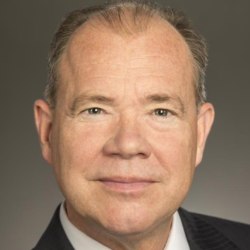Debt Addicts Spend Big Opposing Prop. 53
The usual suspects are digging deep into their pockets to make sure that California’s borrowing binge remains unchecked. Contractors, unions and bond houses that benefit from state debt are contributing millions to defeat Proposition 53, the Stop Blank Checks initiative. This straightforward proposal simply requires voter approval of state issued construction bonds larger than $2 billion.
These insiders are being joined by the ultimate insider, Gov. Jerry Brown, who has contributed $4.1 million left over from his 2014 reelection campaign. So far, over $15 million in campaign cash is being used for a massive television buy featuring the governor calling for Prop. 53’s defeat because, he says, it will increase the cost of “roads, bridges and hospitals.” This claim is ludicrous on its face. Prop. 53 creates no new costs, but allows taxpayers to approve new debt.
Even if he believes his own words, Brown may have a less obvious motivation for wanting to defeat Prop. 53. He is concerned about his legacy and fears that allowing voters to decide important spending issues might make it more difficult to build that upon which he has seized as his ticket to immortality, California’s High Speed Rail project.
When first elected governor in 1974, Edmund G. (Jerry) Brown, Jr. was the nation’s youngest. Now, in what are probably his final two years in elective office, he is the oldest. Considering his senior status, it would not be surprising if his thoughts have turned to how he will be regarded by future generations. Brown is well aware that his father, Edmund G. Brown, Sr., who served as governor from 1959 to 1967, established a reputation as a builder of freeways and universities. Ironically, this was back in the days when the state relied more on a “pay-as-you-go” approach, rather than on massive borrowing to fund projects.
Brown continues to promote high-speed rail even though it’s now clear it can meet none of the promises made to voters back in 2008 in terms of costs, travel time and no public subsidies. Recent polls show that Californians would overwhelmingly reject what is now seen at best as a sop to political insiders and, at worst, the biggest public works boondoggle in America.
California voters of all stripes support infrastructure improvements. There is no question we need better roads, water storage and bridges. But citizens are tired of being lied to. Both the High Speed Rail project and the infamous Bay Bridge (rusty bolts and all) blew through their original cost estimates by many factors.
Proposition 53 guarantees voter approval for megaprojects which are far more susceptible to questionable financing than small projects. Such voter approval is already required for general obligation bonds repaid from the state’s general fund. Proposition 53 imposes transparency with new debt by preventing the state from issuing “revenue bonds” and other vague instruments of debt, like “certificates of participation,” over $2 billion without voter approval.
So, in looking at the opponents of Proposition 53, we see the “greedy,” those who depend on the continuation of unrestricted government debt to maintain their high life, and the “needy”, in this case a governor desperately seeking a legacy.
Jon Coupal is president of the Howard Jarvis Taxpayers Association — California’s largest grass-roots taxpayer organization dedicated to the protection of Proposition 13 and the advancement of taxpayers’ rights.
